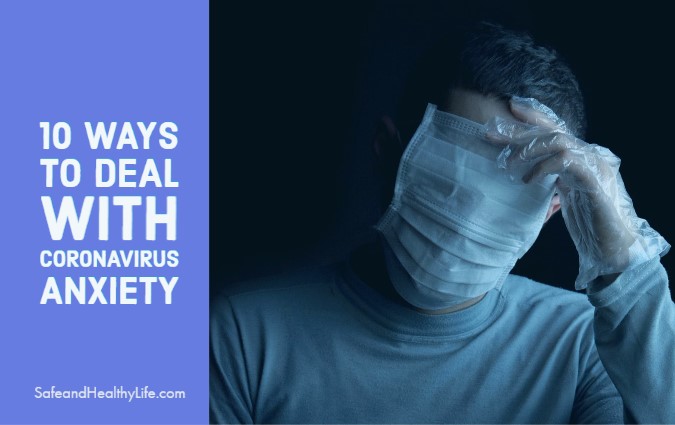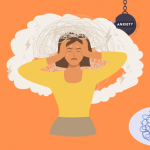
It’s normal to have feelings of anxiety during and after any massive, life-defining event. The COVID-19 pandemic certainly qualifies.
One thing is clear, though – we will collectively get through this. To feel an emotional weight because of the pandemic is completely normal.
However, most of us are not powerless either. Here are some ways to help you deal with the anxiety brought about by this global event.
1. Protect Yourself Smarter
It’s important to learn how to protect yourself and reduce the risks of your catching COVID-19.
Having protective face masks and reusable anti-microbial hand protectors are crucial when you’re out getting important supplies or doing essential work.
Knowing you’re properly protected can go a long way into ensuring you aren’t as anxious during your time outside.
Self-sanitizing Ghluv hand protectors are especially useful, as they feature HeiQ Viroblock technology that neutralizes a wide range of microbes, including human coronaviruses.
They are also much more discreet than surgical gloves and can be used and washed multiple times as well.
2. Keep Yourself Reasonably Well-Supplied
While we’re not suggesting that you hoard several years’ worth of toilet paper, it can give you some peace of mind to stock at least a month’s worth of non-perishable groceries and essential supplies, if possible.
Having the immediate scarcity of supplies of your mind will allow you to focus on other things that matter more to you. If you need anti-anxiety medication, ask your doctor if you can be prescribed a bigger supply.
3. Restrict Your Social Media Activity
The deluge of opinions, arguments, and fake news can further add to feelings of frustration, powerlessness, and anxiety.
Sometimes, it’s no longer worth the toll on your mental health to actively keep up with your social media feed. If browsing Facebook and Twitter seems to worsen your anxiety, try to temporarily discontinue the use of these platforms.
Instead, you can rely on video calls to interact and keep in touch with your friends and family.
4. Use Your Spare Time to Engage in a Productive Hobby
Not feeling productive can be a major cause of anxiety and unease during your quarantine. Rather than staying glued to social media or watching more Netflix, try to engage in a productive hobby. Related.
You can journal, paint, practice on a musical instrument, do yoga, or get around to doing various projects that you’ve been putting off.
5. Schedule an Appointment with a Qualified Psychiatrist or Counselor
If your feelings of anxiety are starting to overwhelm you, see if you can meet with a psychiatrist or counselor. Try to look for one that will do virtual meetings so that you don’t have to leave your home.
6. Keep Yourself Socially Active Through Technology
Social distancing does not necessarily preclude having any further interactions with people. If anything, now is the perfect time to keep in touch with the people who matter the most to you.
If social media is out of the question, you can use apps such as Zoom or Skype to stay in touch with people who matter to you.
7. Know That Millions of People Feel and Understand What You’re Going Through
You aren’t alone in feeling the emotional effects of the COVID pandemic. It has affected life all over the world. You are not going through this alone.
When this is done, there are millions of people who you will be able to talk to about your experience who understand exactly what you went through.
8. Understand That You and Your Loved Ones Will Probably Be OK
Recovery is by large, the most likely outcome of any COVID-19 infection, even for at-risk groups such as older adults.
Even now, we are developing better and better techniques for handling COVID-19 cases that result in better recovery rates.
9. Keep Informed Through Credible Sources
The Centers for Disease Control and Prevention, your local health services, as well as educational institutions involved in solving the COVID-19 crisis are the most credible sources of information on current “best practices”.
Be very skeptical of highly-sensationalized news items, especially if they do not cite credible sources.
Don’t mistake the opinions of popular celebrities and politicians on any part of the political spectrum as fact, either.
10. Try to Stay Physically Healthy
While you might as well live a little while you’re cooped up in quarantine, avoid the temptation to veg out and indulge in too much food during this time. Related.
Take the time to plan healthier meals and to engage in moderate exercise. Doing these will not only boost your immune system, but they can also help keep you in a better mood and reduce some of your anxiety.
Final Thoughts
While the loss of life and economic disruptions caused by the COVID-19 pandemic has been staggering, the emotional toll is nothing to scoff at.
It’s important to note that the anxiety caused by the crisis also has physical effects, including a weaker immune system that leaves sufferers more vulnerable to a COVID infection.
In this context, it’s clear that learning to manage our emotional states isn’t just for improving our mood, it directly helps us avoid possible infections as well.
About The Author:
Misty Jones is a health and wellness expert, author, columnist. She used to deal with fitness, supplement, bodybuilding, and natural weight loss industry and has been extensively published. Her frequently groundbreaking journals and articles can be found in many publications like SheIsPicky.Com. She has been a co-author in various researches relating to health and sports nutrition found in many peer-reviewed journals and websites.




![3 Breathing Techniques Which Relieve Anxiety [And The Science Behind Them] Breathing Techniques Which Relieve Anxiety](https://www.safeandhealthylife.com/wp-content/uploads/2021/09/Breathing-Techniques-Which-Relieve-Anxiety-150x150.jpg)